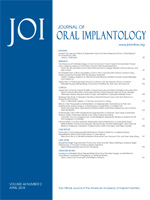
Journal of Oral Implantology Volume 46 Issue 5
The authors provide general recommendations for practices specializing in implant dentistry including prevention, patient prioritization, air filtration, patient assessment, disinfectants, and more; finding that hypochlorous acid (HOCl) is an inexpensive and efficient method of disinfectant.
LAWRENCE, Kan. (PRWEB)
December 04, 2020
Journal of Oral Implantology – The coronavirus pandemic has caused a major effect on the utilization of dental services which could not only impact patient’s oral health but systemic health as well. In 2020, during the outbreak of COVID-19 infections, dentists had been advised to only perform dental treatment in a “dental emergency” to prevent the spread of the SARS-CoV-2 virus. In a recent white paper, published in the Journal of Oral Implantology (JOI), the authors detail the SARS-CoV-2 virus, its potential harm to patients and practitioners, recommendations and guidelines for mitigating the risk of infection, and what constitutes a dental implant emergency.
Individuals infected with COVID-19 display symptoms up to 14 days after infection with upwards of 60% of carriers never displaying symptoms at all. Therefore, all patients must be treated as if they were a potential spreader of the virus. The SARS-CoV-2 virus is spread through saliva in the form of breathing, speaking, coughing, or sneezing with transmission dependent on quantity, size, distance, and environmental factors such as air circulation, humidity, etc. Due to the nature of their work, dental professionals are at a high risk of contracting or passing an infection on to patients.
The authors of this study, James L. Rutkowski, DMD, PhD, Editor-in-Chief of JOI, Daniel P. Camm, DDS, and Edgard El Chaar are all distinguished members of the dental community and belong to the American Academy of Implant Dentistry. Using peer-reviewed clinical studies, Centers for Disease Control and Prevention, World Health Organization, Occupational Safety and Health Administration, and United States Environmental Protection Agency guidelines, the authors provide general recommendations for practices specializing in implant dentistry including prevention, patient prioritization, air filtration, patient assessment, disinfectants, and more; finding that hypochlorous acid (HOCl) is an inexpensive and efficient method of disinfectant. The white paper also reviews ideal dental treatment guidelines and mitigation consideration specific to implant practice including invasive implant procedures, procedural preparation of the patient, simple implant procedures, Personal Protective Equipment, and more.
When the term “dental emergency” is not clearly defined by governmental leaders, dental specialty associations should define what constitutes an emergency and subsequent emergency care. In the case of implant dentistry, procedures are generally regarded as elective and do not qualify as an emergency however, long term delay of implant treatments may lead to implant failure and negatively impact the patient’s health. In this white paper, the authors describe a dental implant emergency as “an issue involving the teeth, dental implants, and/or supporting tissues that would be, if left untreated, harmful to the patient’s oral or systemic health in the near-term.”
While delayed dental care is sometimes necessary, it is only recommended in areas of heightened outbreaks of COVID-19. When proper precautions are taken, including proper PPE and facility protection, infection prevention is highly successful for both practitioner and patient.
Full text of the article “AAID White Paper: Management of the Dental Implant Patient During the Coronavirus Pandemic and Beyond,” Journal of Oral Implantology, is available at https://doi.org/10.1563/aaid-joi-D-20-00316.
###
About the Journal of Oral Implantology
The Journal of Oral Implantology is the official publication of the American Academy of Implant Dentistry and of the American Academy of Implant Prosthodontics. It provides valuable information to general dentists, oral surgeons, prosthodontists, periodontists, scientists, clinicians, laboratory owners and technicians, manufacturers, and educators. The JOI distinguishes itself as the first and oldest journal in the world devoted exclusively to implant dentistry. For more information about the journal or the AAID, please visit http://www.joionline.org
Share article on social media or email:

